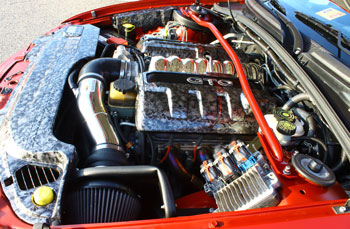SEMA News—April 2020
LEGISLATIVE AND TECHNICAL AFFAIRS
By Stuart Gosswein
FEDERAL UPDATE
 New Jersey—Vehicle Warranties: New Jersey Governor Phil Murphy signed into law legislation to require new-car dealers to provide purchasers written notice that it is illegal for manufacturers or dealers to void a warranty or deny coverage because aftermarket or recycled parts were installed or because someone other than the dealer performed service. |
Chinese Tariffs: The United States and China signed a phase-one trade deal whereby China will buy more U.S. goods and implement some structural changes to its trade laws. However, the Trump Administration intends to continue the 25% tariffs imposed by the United States on List 1, 2 and 3 products until November 2020 at the earliest, when the United States will review and confirm China’s compliance under the accord. Lists 1 and 2 include miscellaneous metal and rubber parts, wiring and measurement devices. List 3 covers most auto parts imported from China. The phase-one accord includes intellectual-property enforcement measures and provisions to end the practice of pressuring foreign companies to transfer their technology to Chinese companies as a condition for obtaining market access, administrative licenses, or receiving advantages from the government. The accord includes a dispute resolution mechanism via bilateral consultations, with the ability to impose tariffs if disputes cannot be resolved. A phase-two agreement will seek to address other outstanding issues, such as reducing the U.S.-China trade imbalance, addressing cyber-theft and stopping Chinese subsidization of key industries. Phase-two negotiations are not expected to begin in earnest until after the November election. A reduction or removal of the 25% tariffs may also be tied to completion of the phase-two negotiations.
Auto Tariffs: The Trump Administration is pursuing trade talks with Europe and Japan following completion of the United States-Mexico-Canada Agreement (USMCA) and China’s phase-one accord. President Trump has stated his willingness to impose tariffs on imported automobiles and auto parts as bargaining leverage in the upcoming trade talks.
Retirement Plans: The Setting Every Community Up for Retirement Enhancement Act (SECURE Act) was signed into law in December 2019. It makes a number of significant changes to U.S. retirement policy, including simplifying the process for small businesses to join multiple employer plans by not requiring businesses to be affiliated; increasing tax credits for small businesses adopting a retirement plan; permitting part-time employees to enroll in 401(k) plans; increasing the age when individuals must start withdrawing money from an IRA from 70½ to 72; repealing the age cap on contributing to an IRA (currently 70½); and protecting employers offering annuities from liability if the insurance company administering the plan is not able to make payments. While many SECURE Act provisions are favorable for small businesses and workers, the new law eliminates stretch IRAs, which are an estate-planning tool that has allowed individuals to pass their retirement funds to their children, grandchildren or other beneficiaries. The law now limits to 10 years the amount of time individuals inheriting a retirement account may take before fully withdrawing funds from the account. It also increases penalties charged to businesses that fail to file retirement plan returns—errors that small businesses make more often than large corporations.
 West Virginia—Inoperable Vehicles: The West Virginia House of Delegates introduced SEMA-model legislation to permit automotive collecting activities on residential property if the vehicles are kept out of ordinary public view. The bill awaits consideration in the House Political Subdivisions Committee. |
STATE UPDATE
Kansas—Military Vehicles: The Kansas House of Representatives introduced a bill to allow for the registration and on-road use of surplus military vehicles. Currently, only antique military vehicles more than 35 years old can be registered for road use. The bill has been introduced and referred to the House Committee on Transportation, where it awaits consideration.
New Hampshire—License Plates: A bill that would have required passenger vehicles to display only a single rear license plate died as the New Hampshire Legislature convened for the 2020 session.
New Jersey—Historic Vehicles: A bill that would have permitted the use of historic motor vehicles for occasional travel or pleasure driving, not more than one day per week, failed to pass as the legislature convened for 2020. Currently, historic vehicles are allowed to be used only for exhibition and educational purposes.
New Jersey—Street Rods and Customs: The New Jersey Assembly reintroduced legislation to create vehicle registration classifications for street rods and custom vehicles. The bill defines a street rod as an altered vehicle manufactured before ’49, and a custom as an altered vehicle at least 25 years old and manufactured after ’48. The bill awaits consideration in the Assembly Transportation and Independent Authorities Committee.
New York—Fees: The New York Senate introduced a bill to exempt historic-vehicle owners in several cities from paying the Metropolitan Commuter Transportation District supplemental registration fee. The city of New York and the counties of Dutchess, Nassau, Orange, Putnam, Rockland, Suffolk and Westchester are included in the Metropolitan Commuter Transportation District. The bill awaits consideration in the Senate Transportation Committee.
New York—Street Rods and Customs: The New York Assembly introduced legislation to create a vehicle titling and registration classification for street rods and custom vehicles. The bill defines a street rod as an altered vehicle manufactured before ’49 and a custom as an altered vehicle at least 25 years old and manufactured after ’48. The bill awaits consideration in the Assembly Transportation Committee.
New York—Vehicle Inspection: The New York Assembly introduced legislation to require a biennial safety inspection instead of an annual inspection for antique, classic and collector vehicles. The bill awaits consideration in the Assembly Transportation Committee.
Rhode Island—Vehicle Inspection: A bill that would have extended emissions exemptions to motor vehicles in their first five model years died as the Rhode Island Legislature convened for its 2020 session. Current law does not make any exemption for new vehicles.
Washington—Vehicle Registration: The Washington legislature introduced companion bills to restrict the eligibility of horseless carriages. If passed, the bill will raise the age of vehicles eligible for horseless-carriage license plates to those manufactured prior to 1916, removing the current rolling age requirement of 40 years old or older. The bills currently await consideration in the House and Senate Transportation Committees.
West Virginia—Military Vehicles: The West Virginia House of Delegates introduced a bill to allow antique military vehicles to display an alternate registration insignia as opposed to a traditional license plate. Antique vehicle plates are currently available for vehicles that are more than 25 years old and owned solely as collectors’ items. The bill passed the West Virginia House in 2019, but by rule it has returned to the House Committee on Technology and Infrastructure, where it currently awaits consideration.
West Virginia—Vehicle Taxes: The West Virginia legislature introduced companion bills to exempt certain vehicles in the state from personal property taxes. Currently, the bills await consideration in the House Technology and Infrastructure Committee and Senate Transportation and Infrastructure Committee.






